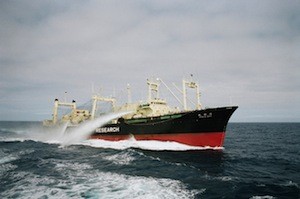JAPAN / AUSTRALIA. On March 31, 2014, the International Court of Justice (ICJ) ruled that Japan’s whaling program in the Antarctic, the second phase of Japanese Whale Research Program (JARPA II), could not be classified as scientific study and Japan had breached international obligations. The case against Japan was brought forth by Australia in May 2010, and New Zealand acted as an intervening state to provide additional observations from 2012. After four years of observations and deliberations, the Court ruled Japan must terminate all activity associated with JARPA II and future permits for whaling must fall within international regulations.
Seven days after the ICJ’s ruling, Australia and Japan signed a Free Trade Agreement (FTA) and the ICJ decision was kept firmly separated from the negotiations. It is the first time that Japan has signed a FTA with a major farm-exporting country, according to the Japan Times.
The comments by Japan’s Prime Minister Shinzo Abe and Australia’s Prime Minister Tony Abbott regarding the ICJ’s decision however, reflect Australia’s fragile political polarity. Australian Trade Minister Andrew Robb said: “The Japanese negotiators have not even raised it.”
“The Australian Government has made it clear to the Japanese that Labor brought the case. The Japanese have made it clear they appreciated Mr Abbott’s reaction to the result – they saw it as restrained. I am told Mr Abe himself does not see Australia as the bad guy… his anger is directed at the Japanese officials who lose the litigation Japan considered unlosable.”
So, in a stroke of political partisanship, Mr Abbott undermined the political effect of the ICJ decision by blaming it on his predecessors in the now-opposing Labor party. That was the same Labor party that was so wracked with infighting that it leap-frogged its own Prime Minister. Kevin Rudd was deposed by his deputy Julia Gillard, who was in-turn replaced by Kevin Rudd, who lost the 2013 election to Tony Abbott. As a second-time Prime Minister himself, and part of Japan’s revolving door of Prime Ministers since 2006, Shinzo Abe could probably relate to Labor’s situation.
Abbot’s attribution of the case against Japan, which was a response to public sentiment by Australians against Japanese whaling and the ineffectiveness of diplomacy, to the former government and its political roundabout undermined the seriousness of Australian public opinion and firmly demonstrates the separation between international law and money. His willingness to be steamrolled politically by Shinzo Abe’s graces and hospitality may have also left Australia vulnerable to other crafty political maneuvres in future negotiations. In both the ICJ decision and the FTA, the Australian government may have gotten a win, but ultimately the Japanese government maintains the upper hand. Firstly, the ICJ ruling extends only to the Antarctic and does not include the North Pacific, where the Japanese also have significant whaling operations. It also only prevents the continuation of the JARPA II project and holds Japan to uphold international conventions in future whaling operations.
Secondly, the agreements from the FTA appears distinctly one-sided: Japan will halve its tariffs on Australian beef (from 38.5 per cent) over 15 to 18 years, and in exchange Australia will remove the tariffs on Japanese automobiles within three years. Immediately, one wonders what the Japanese state and economy will be like in 15 to 18 years. In the meantime, Australia has secured short-term gains of Japanese imports, lowering the tariffs on white goods, and consumer electronics. This is predicted to have a significant flow-on benefit for Australian consumers, reducing the cost of a small Japanese car by AU$1500. These so-called benefits of the FTA allow the Japanese automotive industry to gain an even greater foothold in the Australian market, especially with the announced end of Australian manufacturing by Toyota, Holden (GM) and Ford. Ironically, Tony Abbott pledged to help Australian workers disadvantaged by the withdrawal of automotive manufacturers in Australia.
With the FTA victory notched on his belt, Tony Abbott has continued his tour of Asia to secure deals with China and South Korea. He hopes for a “trade trifecta” and the Government has already pledged its determination to create a Trans-Pacific Partnership Agreement (TPP) network of FTAs, a kind of North American Free Trade Agreement (NAFTA) for Asia. The Australian government will need to be savvy to make sure Australia doesn’t find itself in a trifecta of unfavourable FTAs with long-lead times before the benefits start to flow. He should also remember that “bashing” (an Australian euphemism) political opposition is not going to bring any favours. Best keep your dirty linen on the Qantas flight.

